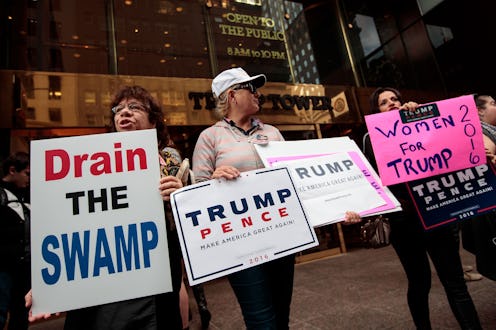News
This Is How Many People Voted For Donald Trump
Well, the results are in and the presidential election is finally over. While Donald Trump may have won the Electoral College vote, you may be wondering what the individual vote totals for the Republican candidate were. So, how many people voted for Donald Trump overall?
While the polls were constantly changing throughout the election cycle, Nate Silver's FiveThirtyEight predicted that Clinton was more likely to win the election than Trump, both by popular vote and electoral vote. A hypothetical map Silver made of what would happen if only women voted showed Clinton winning 458 votes to Trump's 80. That map went viral in October, and prompted a slew of other "what if" maps. The projection map of what would happen if only men voted showed the opposite, with Trump overwhelmingly winning over Clinton. And if white people didn't vote, Mother Jones projected that Clinton would win all 538 electoral votes. It's interesting that when voters actually cast their ballots, more than 59,580,000 of them voted for Trump, compared to the 59,790,000 who voted for Clinton, as of 5 p.m. on Wednesday.
When voters cast their ballots for the candidates of their choice, they are actually voting for electors who will come together as the Electoral College to elect the president and vice-president. And strangely enough, it is possible to win the popular vote but still lose the presidency, as Al Gore did during the 2000 election. Electors aren't actually required to cast their own votes until mid-December, and after that point, the president of the U.S. Senate (in this case, Vice President Joe Biden) receives the sealed votes. On Jan. 6, 2017, Biden will read all of the votes aloud. A candidate needs 270 electoral votes to win, otherwise Congress will make the final decision.
In 48 states and the District of Columbia, the candidate that wins the most individual votes in that state wins the votes of all of that state's electors. (The electors are split proportionally in Maine and Nebraska.) Electors aren't actually required to vote as pledged, but no "faithless" elector has ever changed the results of an election. It's likely that since Trump was declared president-elect, he will indeed be our president come Inauguration Day.
